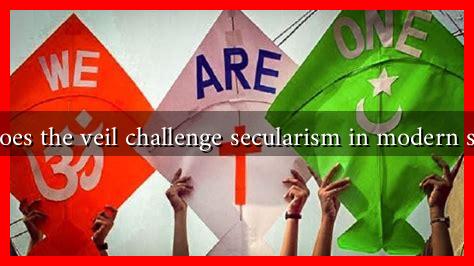-
Table of Contents
How Does the Veil Challenge Secularism in Modern Society?
The veil, often associated with Islamic culture, has become a focal point in discussions about secularism in contemporary society. As nations grapple with the balance between religious expression and secular governance, the presence of the veil raises critical questions about identity, freedom, and the role of religion in public life. This article explores how the veil challenges secularism, examining its implications in various contexts and providing insights into the ongoing debates surrounding this issue.
The Veil as a Symbol of Identity
The veil, whether in the form of the hijab, niqab, or burqa, serves as a powerful symbol of identity for many Muslim women. It represents not only religious beliefs but also cultural heritage and personal autonomy. However, this expression of identity often clashes with secular principles that advocate for a neutral public sphere. The following points illustrate this tension:
- Religious Expression vs. Secular Norms: In secular societies, the expectation is that public spaces remain free from religious symbols. The veil, as a visible marker of faith, challenges this notion.
- Personal Choice vs. Societal Pressure: While many women choose to wear the veil as an expression of their faith, others may feel pressured to conform to societal expectations, complicating the narrative of personal freedom.
- Intersectionality: The experience of wearing a veil varies significantly among women, influenced by factors such as ethnicity, socio-economic status, and personal beliefs, which adds layers to the debate on secularism.
Case Studies: The Veil in Secular States
Several countries have implemented laws and policies regarding the wearing of the veil, reflecting their unique approaches to secularism. Here are notable examples:
- France: In 2004, France enacted a law prohibiting the wearing of conspicuous religious symbols in public schools. This law was justified as a means to uphold secularism but has been criticized for disproportionately affecting Muslim girls and women.
- Turkey: Historically, Turkey has maintained a strict secularism, banning the hijab in public institutions. However, recent years have seen a shift, with the government easing restrictions, reflecting changing attitudes towards religious expression.
- Belgium: In 2011, Belgium became one of the first European countries to ban the burqa in public spaces, citing security concerns and the need for social cohesion. This ban has sparked debates about the limits of secularism and individual rights.
The Impact on Social Cohesion
The presence of the veil in public life can lead to divisions within society, raising questions about integration and social cohesion. Some argue that the visibility of religious symbols can create barriers between communities, while others contend that embracing diversity strengthens societal fabric. Key considerations include:
- Polarization: The veil can become a symbol of division, leading to increased polarization between secular and religious communities.
- Dialogue and Understanding: Conversely, the presence of the veil can foster dialogue about cultural differences and promote understanding among diverse groups.
- Policy Implications: Governments must navigate these complexities when formulating policies that respect both secularism and religious freedoms.
Statistics and Public Opinion
Public opinion on the veil varies widely across different regions and demographics. According to a 2020 survey by the Pew Research Center, attitudes towards the hijab differ significantly between countries:
- In France: 62% of respondents believe that wearing the hijab should be banned in public spaces.
- In Turkey: 70% of respondents support the right to wear the hijab in public institutions.
- In the United States: 55% of Americans believe that individuals should have the right to wear religious symbols, including the veil.
Conclusion: Navigating the Future of Secularism and Religious Expression
The veil presents a complex challenge to secularism in modern society, highlighting the delicate balance between individual rights and collective norms. As nations continue to navigate this issue, it is essential to foster dialogue that respects both secular principles and religious freedoms. The future of secularism may depend on our ability to embrace diversity while upholding the values of equality and respect for all individuals, regardless of their beliefs.
In summary, the veil is not merely a piece of clothing; it is a potent symbol that challenges the foundations of secularism. By understanding the nuances of this debate, societies can work towards more inclusive policies that honor both secularism and the right to religious expression.
For further reading on the intersection of religion and secularism, visit Pew Research Center.

